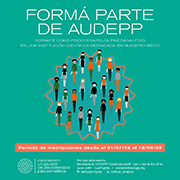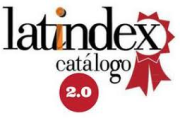POSTGRADUATE TRAINING IN THE CONSTRUCTION OF THE ANALYST’S PERSPECTIVES ON PSYCHOSES
DOI:
https://doi.org/10.53693/ERPPA/3.2.8%20Keywords:
perspectives, training, psychosis, institutionAbstract
This article seeks to open questions about the role of psychoanalytic training in the construction of the analyst’s perspectives when encountering psychoses. It develops general ideas from the author’s thesis project and suggests questions around the specific
role of training in Postgraduate University Institute of the Uruguayan Association of Psychoanalytic Psychotherapy and its distinctive characteristics. This paper also underlines the importance of investigating and promoting the analyst’s creativity when working with patients who are going through psychotic experiences.
Downloads
References
Baranger, W. (1994). La situación analítica como producto artesanal. En Artesanías psicoanalíticas (pp. 456-461). Kargieman.
Bernardi, R. (1994). El papel de las teorías: El papel de los determinantes paradigmáticos en la comprensión psicoanalítica. Revista Uruguaya de Psicoanálisis, 79/80, 109-154.
Benítez, M. de L. (2019). Prácticas discursivas acerca de la neutralidad en la clínica actual. Estudio realizado en una asociación uruguaya de psicoterapia psicoanalítica [tesis de postgrado]. Instituto Universitario de Postgrado de audepp, Uruguay. Disponible en Biblioteca audepp.
Corominas, J. (1973). Breve diccionario etimológico de la lengua castellana (3.a ed.). Gredos.
Green, A. (2000). What kind of research for psychoanaysis? En J. Sandler, A. M. Sandler y R. Davies (eds.), Clinical and observational psychoanalytic research: roots of controversy (pp. 21-26). Routledge.
Luyten, P., Mayes, L., Fonagy, P., Target, M. y Blatt, S. (2015). Handbook of psychodynamic approaches to psychopathology. Guilford Press.
McDougall , J. (1990). Alegato por una cierta anormalidad. Paidós.
Nemirovsky, C. (2009). El psicoanalista tratando a un paciente grave. Psicoanálisis, 31(1), 129-152.
RecalcLCati, M. (2016). La hora de clase. Por una erótica de la enseñanza. Anagrama.
Roussos, A. J. (2001). La inferencia clínica y la elaboración de hipótesis de trabajo de los psicoterapeutas. Estudio empírico mediante el uso de técnicas de análisis de procesos terapéuticos [tesis de maestría]. Universidad de Belgrano, Argentina. Disponible en http://repositorio.ub.edu.ar/handle/123456789/765
Widakowich, C. (2012). El enfoque dimensional vs. el enfoque categórico en psiquiatría: aspectos históricos y epistemológicos. Alcmeon, 17(4), 365-374.










